It is not very often that you get to enjoy having breakfast by the river on a beautiful fine morning. It is not always that you get to roam around the huge corridors of an elegant mansion. It is not always you get to appreciate the past while living in the present. At Bari Kothi, we did all these. Well, Bari Kothi is a heritage property located in Azimganj near Murshidabad. It is one of the most beautiful Rajbaris of Bengal and heritage hotels in India. Rajbari literally means king’s mansion. But Rajbari here means the houses of the aristocrats of Bengal who were one of the richest persons of Bengal. BariKothi is one such elegant mansion, but the place has many stories to be told and is inexorably linked with the history and cultural heritage of Murshidabad.

Bari Kothi is the ancestral property of the Dudhoria family, almost 250 years old. It has now been restored and renovated to heritage and luxury accommodation. Checkered floors, long corridors, huge Corinthian columns, dangling chandeliers, fountains, furniture of the past, libraries containing old books and all things regal – that is what we discovered at Bari Kothi. Located just beside the Bhagirathi River in Azimganj, Bari Kothi, one of the best heritage hotels in India offers a unique combination heritage, luxury and warmth. Read on to know more about Bari Kothi and our experience.

Bari Kothi | When it all began
Murshidabad was once one of the richest provinces of not only in Bengal but also in the entire country. It was naturally the hub of aristocracy, wealth, culture and extravaganza during the eighteenth century. In 1727, Murshid Quli Khan declared himself the independent Nawab of Bengal Province that consisted of present-day West Bengal, Bihar, Jharkhand and Odisha. The Nawab shifted his capital from Dhaka to Maksudabad and rechristened the city after his name as Murshidabad. This period was one of the golden periods of Murshidabad. Trade and commerce flourished. It is even said that Murshidabad accounted for about 20% of India’s economy and 5% of the world’s GDP. The town was said to be as affluent as that of London.
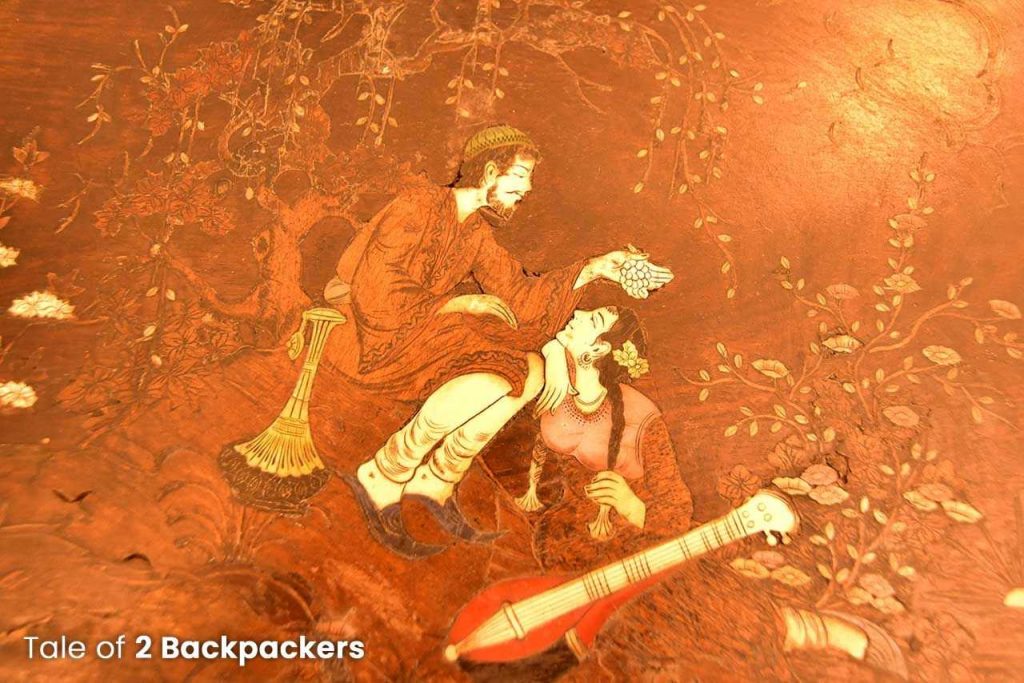
While Murshidabad traded with Europeans like British, Armenians, Portuguese and French, traders and businessmen from other parts of the country were also not immune to the wealth of the town. Traders from Rajasthan came down to Murshidabad and settled down here. It is believed that Manikchand, a Jain merchant arrived at Bengal all the way from the deserts of Rajasthan to the fertile lands of Bengal and became the personal banker of Nawab Murshid Quli Khan. Gradually, other families came to Murshidabad and settled around the twin towns of Azimganj and Jiaganj. Families like Nowlakhas, Dudhoria, Singhis, Dugars, Kotharis and others made Bengal there home and workplace. The community that migrated from Rajasthan came to be known as the Sheherwalis, as they mostly travelled from city (sheher) to city for business.
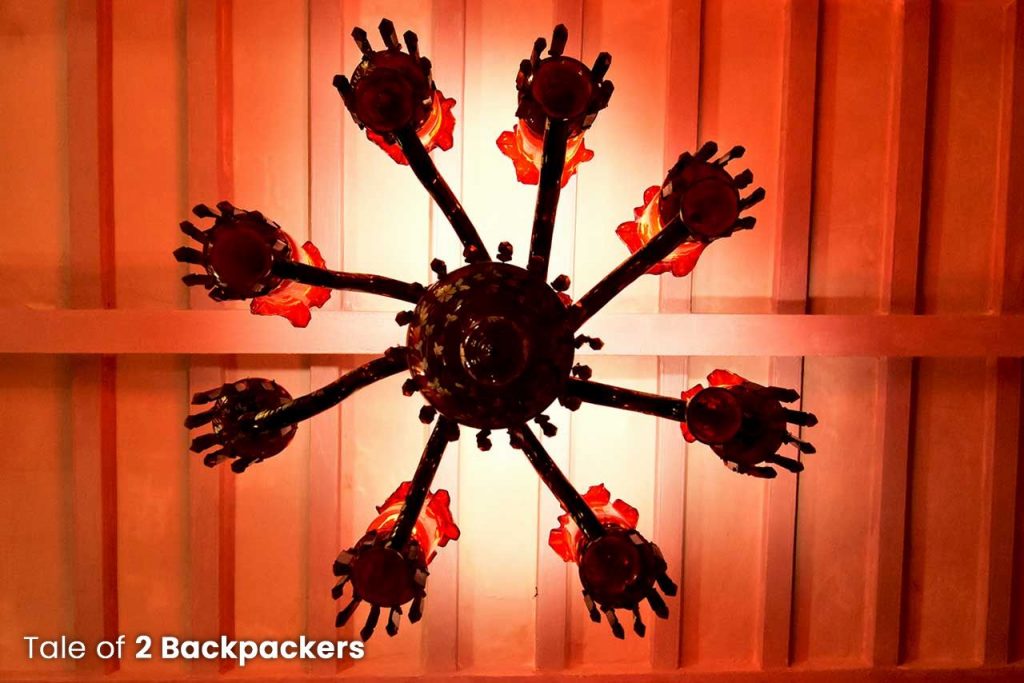
The Sheherwalis became one of the most affluent communities of Bengal and soon they constructed huge mansions for themselves in the Azimganj and Jiaganj area. The mansions were beautiful having European influence in architecture. Long Doric and Corinthian columns, sprawling gardens, long verandahs were all part of these mansions. They also commissioned the building of several Jain temples in the area. The mansions and temples stand till today and tell the story of the glorious past of Murshidabad.

After the defeat of Nawab Siraj-ud-daula in the Battle of Plassey in 1757, Murshidabad gradually started losing its sheen. The British shifted the capital of Bengal to Calcutta and with it, the wealth of Murshidabad too shifted to the new capital. The Sheherwalis too left for Calcutta for better prospects and business. But their houses and mansions remained.
They stood there, warring with the ravages of time. Once a thriving and full of life, the mansions gradually dilapidated. The Sheherwali families still visit their ancestral homes, but the majority of them are in a state of neglect with overgrown plants and crumbling walls.

It was a few years back when the Dudhoria family decided to give an uplift to their property. They decided to renovate it and turn it into a boutique heritage hotel. Bari Kothi is spread over 0.75 acres of land and it was in a state of crumble. So it was not quite an easy task to restore the palace to its former glory. Nevertheless, the work started in 2016. Walls were rebuilt, wooden beams and vintage furniture were restored, the gardens were maintained and finally, Bari Kothi became the finest heritage and luxury stays in Murshidabad.

Bari Kothi | Heritage Hotel in India

Bari Kothi was built in the late 1700s and is one of the most architecturally significant houses in the Murshidabad region. The huge mansion spread over 0.75 acres of land has an influence of Greek, Roman and French architecture.
Bari Kothi literally translates into “Palace of the Elder” (Bari meaning elder and kothi mean palace). This term was coined in the late 1800s as it was the house of the elder brother Rai Bahadur Budh Singh Dudhoria.
Bari Kothi is also a social project as the owners have employed locals for all the work at Bari Kothi. Even the Hotel Manager is a local person from Murshidabad. Inside the property, all the work are managed by local women. They have their own bank account where their salaries are credited. And they maintain their accounts by themselves. Darshan and Lipika, the co-owners were very particular that all the staff members of Bari Kothi would be from the local area only.

Bari Kothi initially had their main gate facing South-west. Later they found out that it was not proper according to Vaastu. So they had sealed the gate and now there is another gate to enter the mansion.
The architect of restoration of the mansion is Samar Chandra, an architect based in Canada. He made Bari Kothi his dream project and turned the ruin into an elegant mansion, one of the most beautiful heritage hotels in India. His love and dedication in the project are seen in his work and quite justly, the owners have named a part of the mansion after him as Samar Mahal.
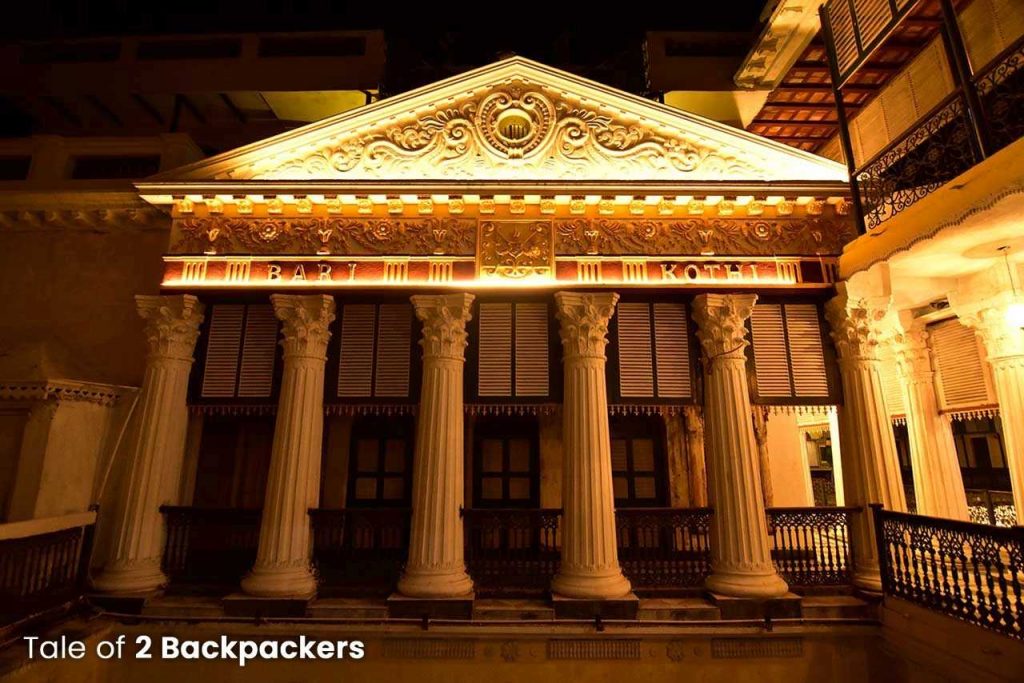
Category of Rooms
Now Bari Kothi has 15 luxurious heritage suites of 3 categories. Each of the rooms has unique features and decorated with vintage furniture and beautiful decorations. The base category rooms are the Heritage rooms with traditional decorations and antique décor. We stayed at one of the Heritage room and it was named Diamond Kamra. The room was beautifully decorated with old furniture and a gorgeous white chandelier.


The other 2 rooms of the Heritage category were the Ruby Kamra and Emerald Kamra. These two rooms had red chandeliers and green chandeliers respectively. The names too were given after much thought. The best part was that each of the three rooms was decorated in a different way, thus giving a unique perspective to each room.

The next category rooms were Royal Heritage rooms that are furnished with 250 years old furniture, high ceilings, rich fabrics and they opened to Sheesh Mahal views.
The most elegant of the rooms are the Maharaja Heritage Rooms with high wooden beam ceilings, carved archways and traditional furniture. A few of the rooms also have a sunken bath.

All the rooms were decorated beautifully and aesthetically. The rooms were a mix of heritage with the right mix of modern amenities.
Inside Bari Kothi
The rooms and courtyards of Bari Kothi have different names. Bari Kothi has a few courtyards and they are called Chowks. The Central Courtyard with the black and white checkered floor has a marble fountain in the middle. The place is also reserved for Baul performances.

Gaddi Ghar was the erstwhile working place of the zamindars. The Gaddi Ghar has beautiful Burma teak pillars and Belgian glass chandeliers. The walls are adorned with pictures and paintings of their ancestors. The rooms displayed the opulence of the Dudhorias. There were 3 green doors at one wall of the Gaddi Ghar. Darshan, our host told us that the cash of the family was kept beyond those green doors.
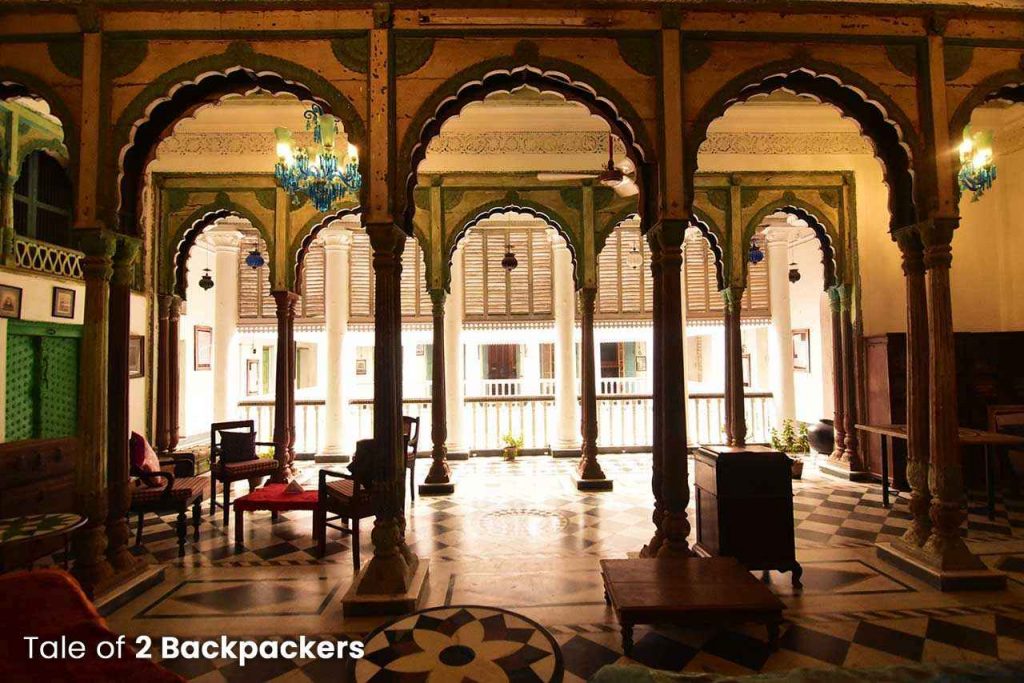

There is also a vault in the building, containing a safe that is fit to be in a bank. The jewels and gold of the family were said to be stored in the vault. Now, all that lies in run-down condition, but once upon a time, it held such riches!

The Darbar Hall on the first floor is more like a ballroom with beautiful hand-painted tiles on the walls, stained glass windows and elegant chandeliers. The Darbar Hall is now used as a dining hall and the Sheherwali cuisine is served here. This hall was said to entertain eminent guests 250 years back.
While a person leaves Bari Kothi, they are supposed to drop a coin on a pot containing water. This is for safe journey and good luck of the traveller. Once you drop the coin, you must leave the house and are not supposed to turn back.
The other rooms and courtyards include the Janana Chowk, Library Chowk, Sheesh Mahal, Library Hall, music room, Halwai Khana, Gulabi Chawra amongst others.

The Bari Kothi Ghat is another place that must be visited. The Ghat or riverfront leads to the Bhagirathi River and is one of the highlights of the property. Breakfast is usually held by the Bari Kothi Ghat beside the Bhagirathi River. Just imagine having breakfast while looking at an amazing view of the river. It was an amazing experience for us.

Experiences at Bari Kothi
Bari Kothi will provide you with a plethora of experiences. Usually the Bari Kothi package consists of accommodation, food, trips to Murshidabad and Azimganj and cultural performances in the evening. You can also attend cooking classes of the Sheherwali cuisine if you want. A typical tour package will consist of the following:
Tour of the Bari Kothi property

You will be given a complete tour of the property. The entire mansion is huge and will take up a considerable amount of time. With the tour, you will also listen to various stories and trivia of Bari Kothi and Murshidabad as a whole. The property takes a different look in the night with lights and lamps lighting the entire mansion. A night tour of Bari Kothi is also highly recommended.
Boat Ride on Bhagirathi and Murshidabad tour

Azimganj is on the other side of Murshidabad town. Bari Kothi arranges a trip to Murshidabad and they take the guests on a boat to the other bank of the river near Hazarduari. A boat ride on the Bhagirathi is a beautiful experience. Once you reach the other side of the river, an e-rickshaw is arranged to go around Murshidabad town to visit the attractions like Hazarduari, Katra Mosque, Jahankosha Canon, house of Jagat Seth, Nasipur Rajbari and more.
Tea is provided on a boat for the guests as a unique experience.
Sunset Boat Ride

A special boat ride is arranged to see the sunset. Believe me, it is going to be an amazing experience. We were a bit late after our trip to Murshidabad town and so missed the sunset ride. But while returning, we saw the setting sun and could well imagine how it would look from the vantage point.
Visit the terracotta temples at Baranagar

Azimganj boasts of some of the most beautiful terracotta temples in Bengal. These temples were built by Rani Bhabani of Natore. Azimganj was once known as the Kashi of the east because of these temples. You can visit the Charbangla Temple, Gangeswar Temple, Bhabaniswar Temple and the Panchamukhi Shiva Temple.
Azimganj Heritage Walk
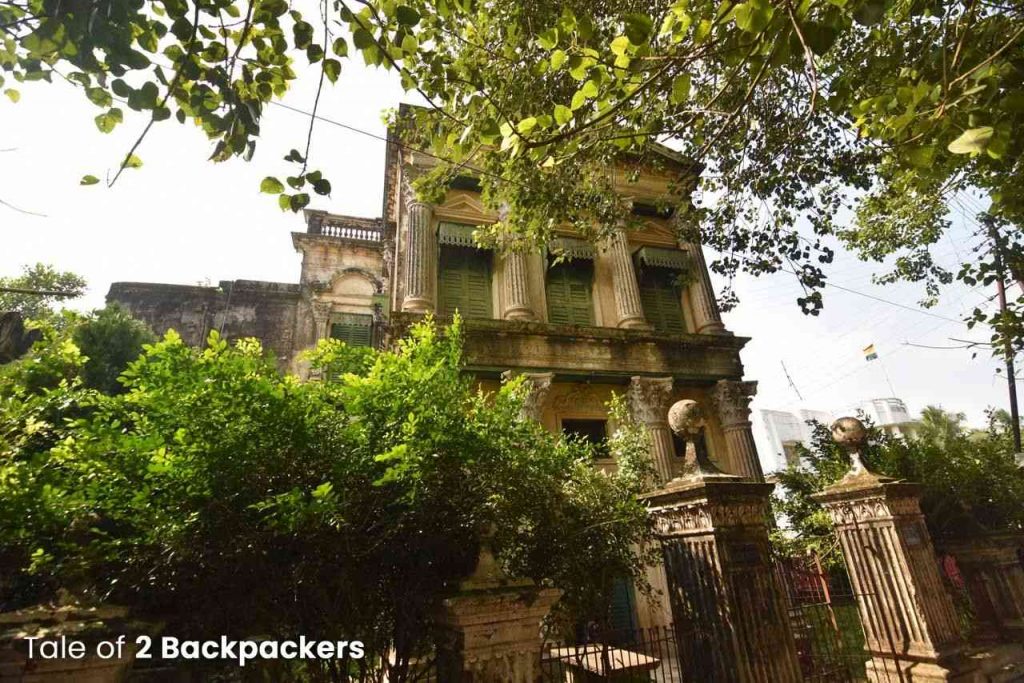
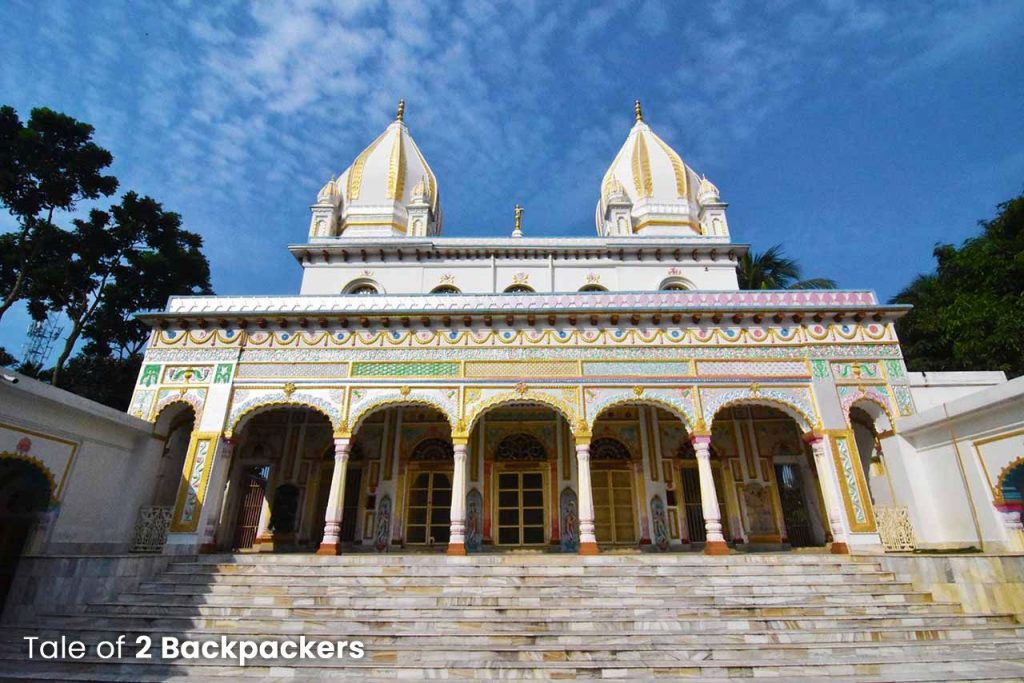
This is the best way to know about the history of Azimganj. Walk around the town to see the mansions and palaces of erstwhile aristocrats and the Jain Temples.
Cultural performances

You can enjoy various cultural performances like Baul songs, Raibeshe dance at Bari Kothi. The central courtyard is the place where Baul performances usually take place.
A visit to Tantipara

Murshidabad is known for its silk saris. So you can take a visit to the Tantipara in Jiaganj. It is the place where the saris are woven.
Recommended Read: Murshidabad Tour Guide – beyond Hazarduari
Sheherwali Cuisine cooking class
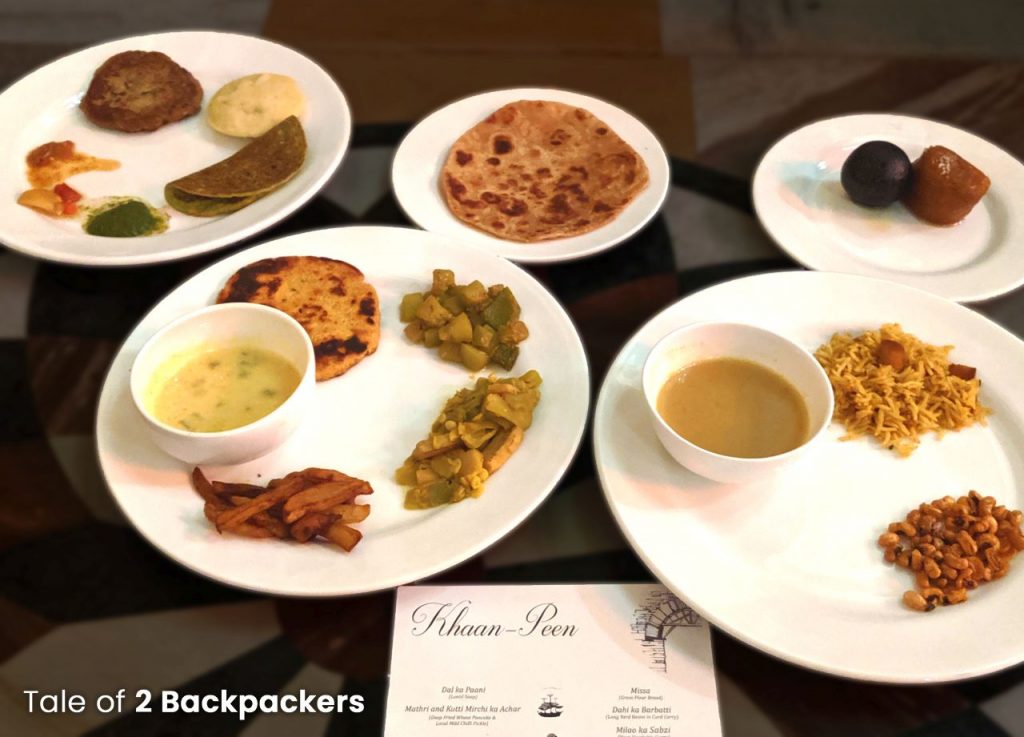
A cooking class can also be arranged by the hosts if you want to learn the nuances of Sheherwali cuisine. Sheherwali cuisine is a unique cuisine. Totally vegetarian, the cuisine has the influence of the Jain, Marwari and Bengali cuisine.
Bari Kothi Review | Our experience
We had an amazing experience staying at Bari Kothi. As we have kept on mentioning that the décor and interiors of the property are amazing. The hospitality and warmth that we received by our hosts Lipika and Darshan, as well as the staff of Bari Kothi, were one of the best. Bikram, our guide to Murshidabad and Azimganj walk was such an affable person and was always ready with answers to all our questions.
We absolutely loved the breakfast by the river. Sheherwali cuisine was something new to us. It was a learning experience to know about the culture and heritage of the place.


How to reach Bari Kothi?
Bari Kothi is located at Jain Patty in Azimganj. The best way to reach Bari Kothi is by taking a train from Howrah to Azimganj. You can take Ganadevta Express from Howrah station which departs at 6.00AM and Intercity Express that departs at 3:15PM. From Azimganj Station, Bari Kothi is about 10 minutes Toto (e-rickshaw) ride.
For booking and tariff, please contact them directly by phone at +91 9051200800 or send an email to info@barikothi.com
Here are a few more pictures of Bari Kothi for you!



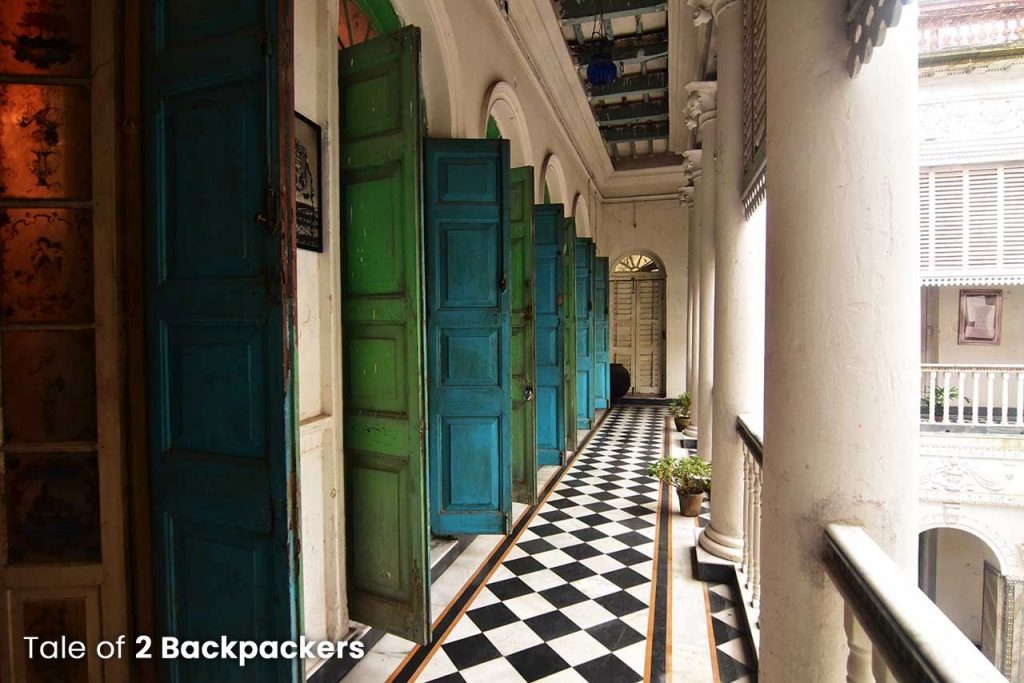
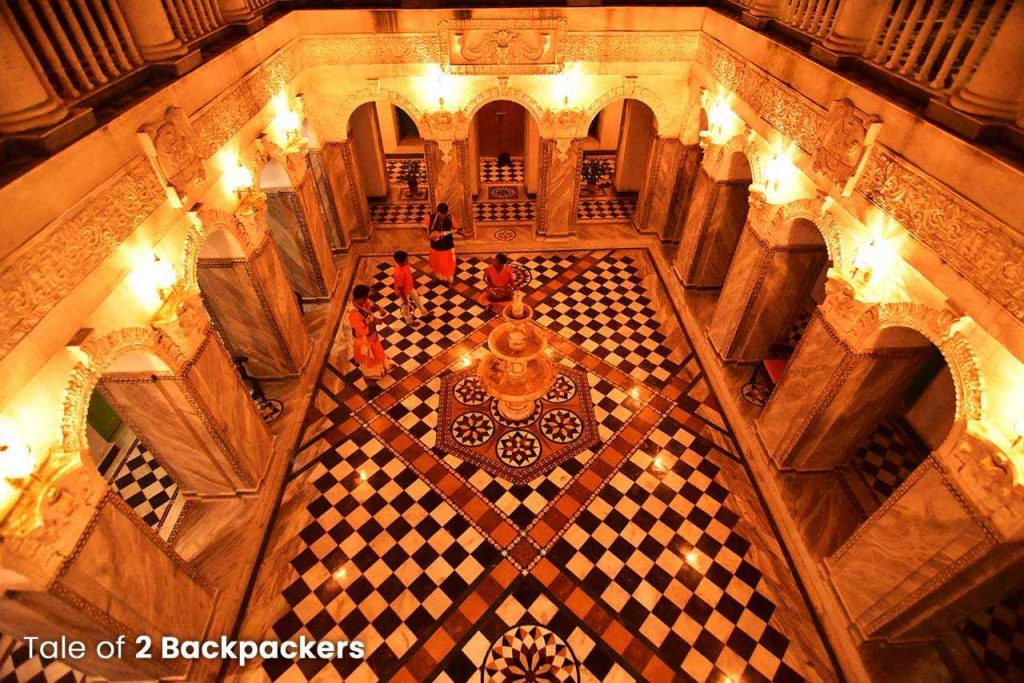




Disclaimer: We were hosted by Bari Kothi on this trip to Murshidabad and Azimganj. The views that are given in the post, however, are completely our own.
Our sincere thanks to Darshan and Lipika Dudhoria for hosting us, all the staff members of Barikothi for the amazing hospitality and my fellow bloggers Rangan Datta, Debjani, Tanayesh and Masood.
What do you think about Bari Kothi? Would you like to visit this heritage hotel in Murshidabad India? Let us know in comments below. Please share the post and let others know about this wonderful place.
Pin it for a later read!






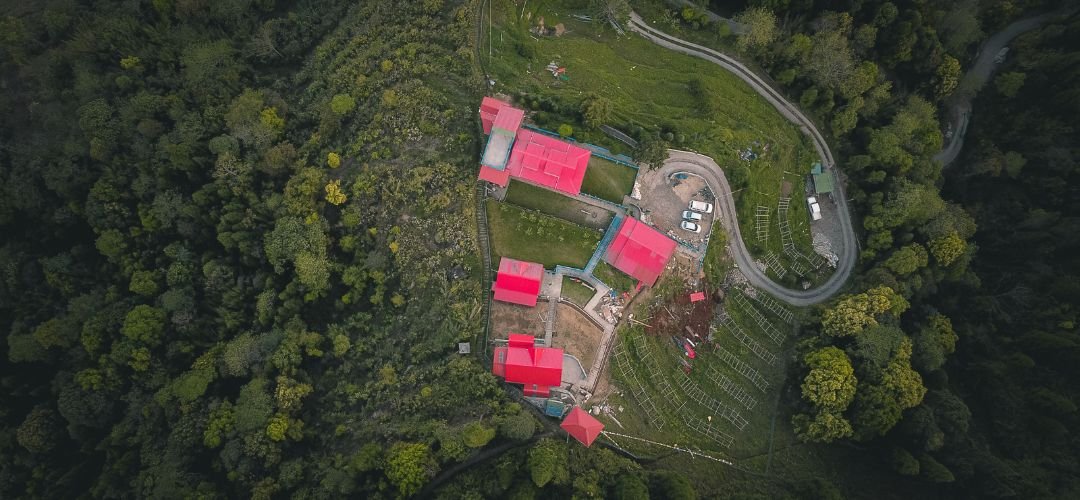


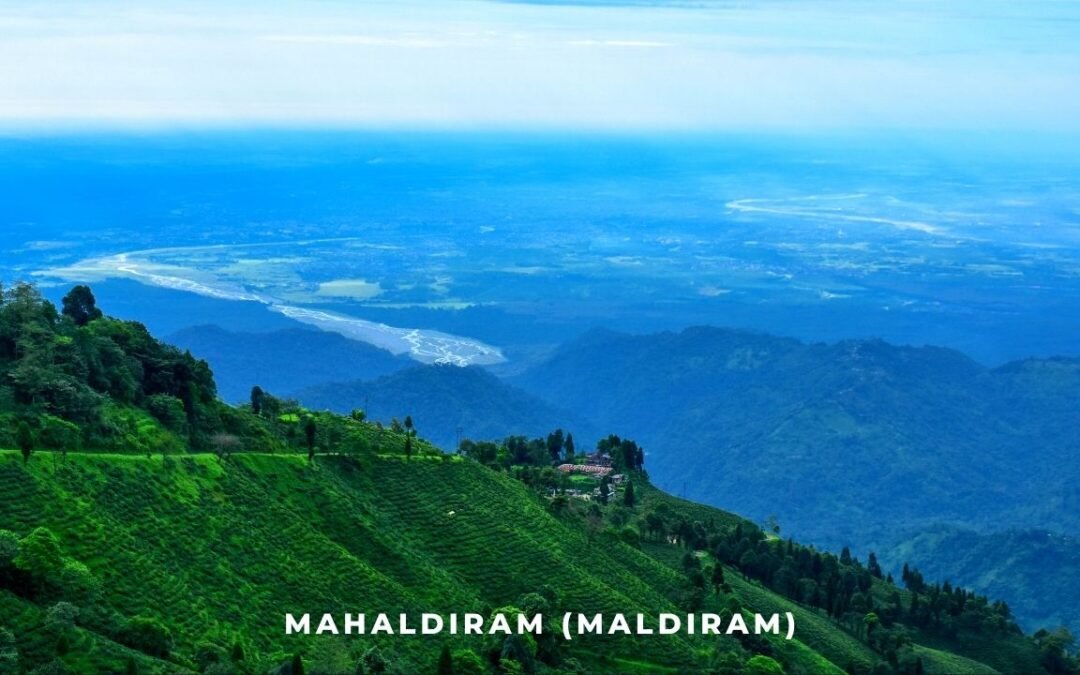
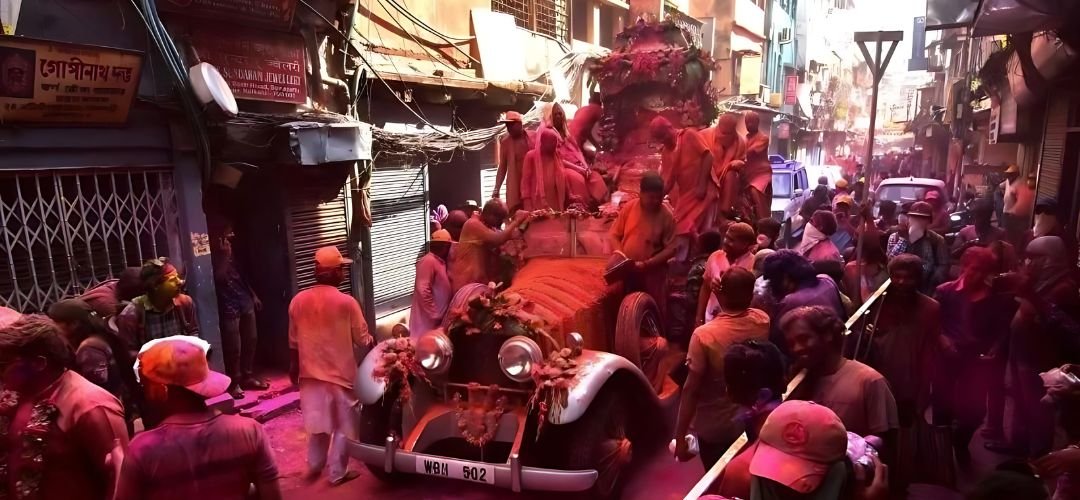
Thanks for the apt and detailed experience. I would like to know about the food served during your stay. Whether it was completely veg or you were given option to choose between veg and non-veg?
Thank you Shankha for your kind words. The family is Jaina and so the food served is completely vegetarian.
I love when hotels are built into historic properties. It does let you enjoy the past. With modern and luxury conveniences. Bari Kothi looks like it has been beautifully restored and the Greek, Roman and French architecture preserved. I would feel like royalty staying here. The view from the water at sunset would be magical. What a lovely spot to stay.
Thank you Linda. Bari Kothi was a total revelation.
I initiallty thought this was a museum. The place looks like a blast from the past and getting to experience the luxurious life of royals in the past is definitiely a treat. Although there were some photos that looks a tad creepy for me especially the beds but hey that defo adds to the authentic feel of the place.
Yes, the place looks so beautiful.
what a beautiful palace with so much history. It was so interesting to read about the history of this location of Bengal. I am glad this piece of history has been restored to highlight the glamor and oppulence of the time. As a chef, I would definitely take the cooking class. I am sure that must be so much fun!
Thank you Mireille. I am sure you will love the cooking classes. They teach you how to prepare dishes of Sheherwali cuisine, which is quite a fusion cuisine.
The Bari Kothi property is gorgeous, the restoration was worth the time and effort for sure and I love the idea of staying in a palace. The central corridor and Maharaja Heritage Room are my favorites. I would love to take a cooking class and watch a cultural performance
Thank you so much. Yes, cooking class was quite interesting. It is always fun to learn new dishes!
I never knew about Bari Kothi which is a heritage property located in Azimgunj near Murshidabad. It must be great to stay in this heritage hotel as it has royal lineage. I loved the Gaddi Ghar which was working place of the zamindars. Also the has beautiful Burma teak pillars and Belgian glass chandeliers makes it very elegant. Visiting the terracotta temples at Baranagar must be great here.
Thank you Yukti! Bari Kothi was really amazing.
This looks like a lovely hotel! I absolutely love the black and white checkered floors. I feel like I could spend hours exploring this hotel and admiring all the little details. The food look great as well!
Thank you Hailey! Bari Kothi is worth all the admiration.
Breakfast by the river sounds fantastic. Vast corridors, not that amazing 😉 I would be afraid to get lost. However, it’s good to hear that this beautiful place was restored and has old shine due to Samar Chandra from Canada. Rooms seem to be huge, especially Royal Heritage rooms or Maharaja Heritage Rooms. I understand they are not for everyone. I love the architecture of the Courtyard and Darbar Hall. The only thing I miss from your article is the answer to the question if I can afford it? 😉
Haha! I can understand your fear about corridors. I was infact lost in the maze of corridors when I decided to explore on my own. But I found my way alright. And regarding affordability, I am sure you can. The tariff is not very high and it depends on the package and service you choose.
Bari Kothi is absolutely stunning. From the rooms , the interior decor to the courtyards and various rooms. The renovations are just perfection. The fact that they only employ locals is inspiring and would help me to make the decision to book a room all the easier. I love that they do that! On top of that the coordinated tours and cooking classes (vegetarian- yes please!) make vacation planning all the more simple.
Thank you! Yes, Bari Kothi makes vacation quite simple with all their services. It is a beautiful place.